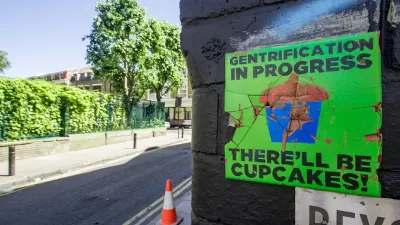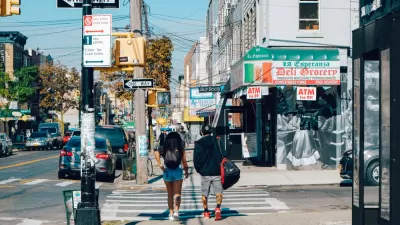Journalist Peter Markowitz has written a provocative, and profoundly disingenuous, analysis of the causes and effects of gentrification in American cities. He sows division at a time that requires collaboration, writes Josh Stephens.

"Gentrification, by which Moskowitz refers to a range of urban crises that he considers, not unreasonably, to be violent, discriminatory, and unjust, is the most vivid and surely most emotionally fraught of the great urban challenges that American cities face. Moskowitz discusses the issue passionately and urgently -- and totally disingenuously."
"He mentions housing scarcely more often than he does jobs, and only then to promote subsidized affordable housing. Never mind the fact that, at least in New York and the Bay Area, it’s the lack of housing supply (both market rate and subsidized) that drives up prices and drives out residents who can’t afford those prices. Capital salivates when restrictive zoning, which typically has little to do with Goldman Sachs and much to do with incumbent homeowners, drives up real estate values."
"I get it. Capitalism is ruthless. The United States is racist. Governments, especially the feds, have betrayed the poor. Moskowitz is more than entitled to illustrate those flaws. But you know what else is flawed? Disingenuously complaining about a deadly serious matter without offering constructive, viable solutions."
"Herein lies the danger of How to Kill a City: it is a deliberately antagonistic book. And there are millions of people across this country who might take it seriously. (As of this writing, it’s the number-one seller in its category on Amazon.) Moskowitz clearly doesn't believe in collaboration, compromise, or common prosperity. Meaning, he doesn't really believe in cities."
FULL STORY: Death by Gentrification: Review of 'How to Kill a City'

Planetizen Federal Action Tracker
A weekly monitor of how Trump’s orders and actions are impacting planners and planning in America.

San Francisco's School District Spent $105M To Build Affordable Housing for Teachers — And That's Just the Beginning
SFUSD joins a growing list of school districts using their land holdings to address housing affordability challenges faced by their own employees.

The Tiny, Adorable $7,000 Car Turning Japan Onto EVs
The single seat Mibot charges from a regular plug as quickly as an iPad, and is about half the price of an average EV.

San Diego Votes to Rein in “Towering” ADUs
City council voted to limit the number of units in accessory buildings to six — after confronting backyard developments of up to 100 units behind a single family home.

Texas Legislature’s Surprising Pro-Housing Swing
Smaller homes on smaller lots, office to apartment conversions, and 40% less say for NIMBYs, vote state lawmakers.

Even Edmonton Wants Single Staircase Buildings
Canada's second most affordable major city joins those angling to nix the requirement for two staircases in multi-family buildings.
Urban Design for Planners 1: Software Tools
This six-course series explores essential urban design concepts using open source software and equips planners with the tools they need to participate fully in the urban design process.
Planning for Universal Design
Learn the tools for implementing Universal Design in planning regulations.
Borough of Carlisle
Smith Gee Studio
City of Camden Redevelopment Agency
City of Astoria
Transportation Research & Education Center (TREC) at Portland State University
City of Camden Redevelopment Agency
Municipality of Princeton (NJ)





























